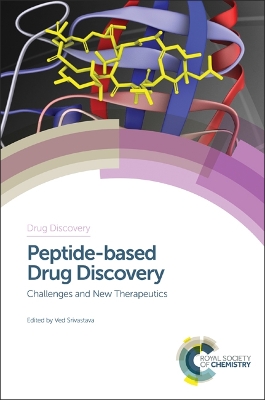Drug Discovery
1 primary work
Volume 59
Peptide-based Drug Discovery
Published 22 June 2017
With potentially high specificity and low toxicity, biologicals offer promising alternatives to small-molecule drugs. Peptide therapeutics have again become the focus of innovative drug development efforts backed up by a resurgence of venture funds and small biotechnology companies.
What does it take to develop a peptide-based medicine? What are the key challenges and how are they overcome? What are emerging therapeutics for peptide modalities? This book answers these questions with a holistic story from molecules to medicine, combining the themes of design, synthesis and clinical applications of peptide-based therapeutics and biomarkers. Chapters are written and edited by leaders in the field from industry and academia and they cover the pharmacokinetics of peptide therapeutics, attributes necessary for commercially successful metabolic peptides, medicinal chemistry strategies for the design of peptidase-resistant peptide analogues, disease classes for which peptide therapeutic are most relevant, and regulatory issues and guidelines.
The critical themes covered provide essential background information on what it takes to develop peptide-based medicine from a chemistry perspective and views on the future of peptide drugs. This book will be a valuable resource not only as a reference book for the researcher engaged in academic and pharmaceutical setting, from basic research to manufacturing and from organic chemistry to biotechnology, but also a valuable resource to graduate students to understand discovery and development process for peptide-based medicine.
What does it take to develop a peptide-based medicine? What are the key challenges and how are they overcome? What are emerging therapeutics for peptide modalities? This book answers these questions with a holistic story from molecules to medicine, combining the themes of design, synthesis and clinical applications of peptide-based therapeutics and biomarkers. Chapters are written and edited by leaders in the field from industry and academia and they cover the pharmacokinetics of peptide therapeutics, attributes necessary for commercially successful metabolic peptides, medicinal chemistry strategies for the design of peptidase-resistant peptide analogues, disease classes for which peptide therapeutic are most relevant, and regulatory issues and guidelines.
The critical themes covered provide essential background information on what it takes to develop peptide-based medicine from a chemistry perspective and views on the future of peptide drugs. This book will be a valuable resource not only as a reference book for the researcher engaged in academic and pharmaceutical setting, from basic research to manufacturing and from organic chemistry to biotechnology, but also a valuable resource to graduate students to understand discovery and development process for peptide-based medicine.
